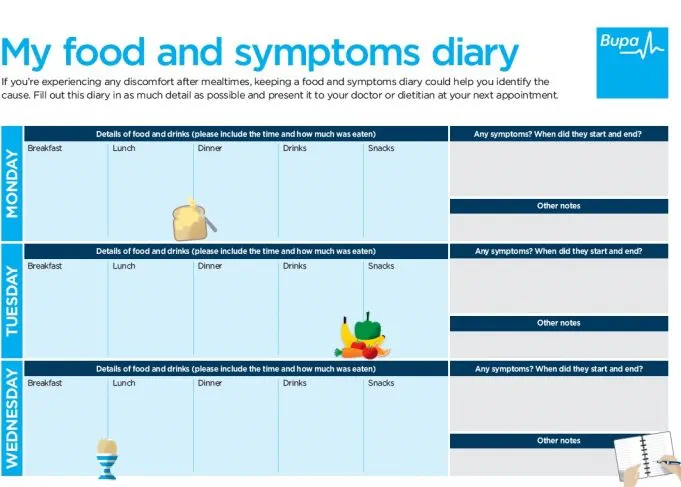Eat
Feel unwell after eating? Try our food and symptom diary
Do you often feel unwell after eating and want to find out why? Your symptoms could be anything from tummy pain, bloating or a headache. With so many different foods on your plate, pinpointing the cause can be tricky.
Keeping a food and symptom diary is a great tool to help you identify allergies and intolerances to certain foods. It can also help you to understand what makes an existing condition worse, such as irritable bowel syndrome (IBS) or migraines.

Why should I use a food and symptom diary?
Put simply, a food and symptom diary records everything that you eat or drink, and any symptoms you have. It’s the most accurate way to see which foods are causing your symptoms.
We’ve created an easy-to-use food and symptom diary to help you keep track. Simply download, print and fill out your diary each day for at least two weeks. Give as much detail as possible. For example, note down if you’re having trouble digesting a particular type of food. Or if you have bloating, wind, diarrhoea, vomiting, or stomach pain after eating certain foods.
Take your food and symptom diary to any appointments you have with a GP or dietitian. This will give them a great insight into what you eat and how certain foods affect you. Download a PDF of the food and symptoms diary (PDF, 1MB).

Top tips for keeping a food and symptom diary
To help you get the most out of your food and symptom diary, follow these simple steps.
- Stick with it. Try to fill out your food and symptom diary every day for at least two weeks, including two weekends.
- Include your fluids. Don’t forget to note down all fluids you drink. This includes caffeinated drinks (and any sugars added), juices and alcohol.
- Go into detail. Give as much detail as possible, including what you ate and how it was prepared. For example, instead of writing a ‘salad sandwich’, write ‘two slices of white bread, mayonnaise, cheese and tomato’. The same applies to the symptoms you have. Did you have them immediately after eating? How severe were they? How long did they last?
- Be honest. Even if you know your meal wasn’t the healthiest choice, write it down. It’s important for a doctor or dietitian to get a complete picture of your diet.
- Take it with you. Keep your food diary with you so you can make note of everything you eat throughout the day. If you try to fill everything out at once, you might forget some vital ingredients.
- Keep food packaging. It might sometimes be helpful to keep food packaging. This can help a dietitian see the ingredients.
- Keep extra notes. Use the ‘other notes’ section to keep a record of anything else you may want to speak to your dietitian or doctor about. For example, include any exercise you did that day or medicines you took. You might also want to note down any feelings or emotions you had following a meal.
Are you interested in learning more about your health? Discover more about our range of health assessments.
-
Sources Sources
- Food allergy and food intolerance. Patient – Professional Reference. patient.info/patientplus, last edited 29 July 2021
- Food and symptoms diary. Allergy UK. www.allergyuk.org, published 11 November 2021
- Irritable bowel syndrome: How should I assess a person with suspected irritable bowel syndrome? NICE Clinical Knowledge Summaries. cks.nice.org.uk, last revised June 2021
About our health information
At Bupa we produce a wealth of free health information for you and your family. This is because we believe that trustworthy information is essential in helping you make better decisions about your health and wellbeing.
Our information has been awarded the PIF TICK for trustworthy health information. It also follows the principles of the The Information Standard.

More eat articles...
Did you find our advice helpful?
We’d love to hear what you think. Our short survey takes just a few minutes to complete and helps us to keep improving our healthy lifestyle articles.
Legal disclaimer
This information was published by Bupa's Health Content Team and is based on reputable sources of medical evidence. It has been reviewed by appropriate medical or clinical professionals and deemed accurate on the date of review. Photos are only for illustrative purposes and do not reflect every presentation of a condition.
Any information about a treatment or procedure is generic, and does not necessarily describe that treatment or procedure as delivered by Bupa or its associated providers.
The information contained on this page and in any third party websites referred to on this page is not intended nor implied to be a substitute for professional medical advice nor is it intended to be for medical diagnosis or treatment. Third party websites are not owned or controlled by Bupa and any individual may be able to access and post messages on them. Bupa is not responsible for the content or availability of these third party websites. We do not accept advertising on this page.




